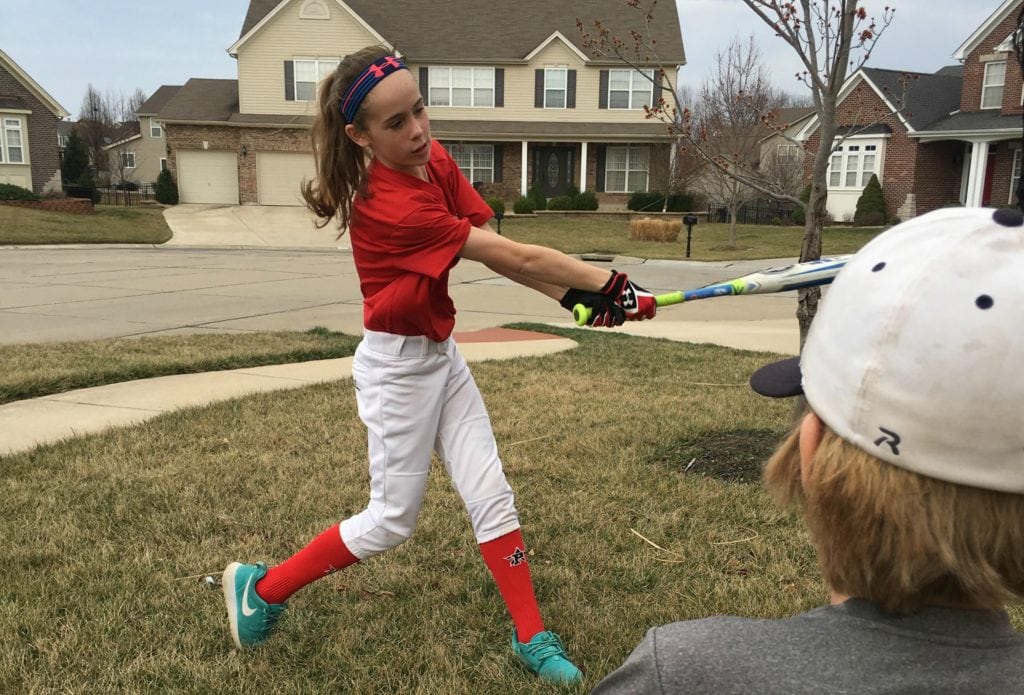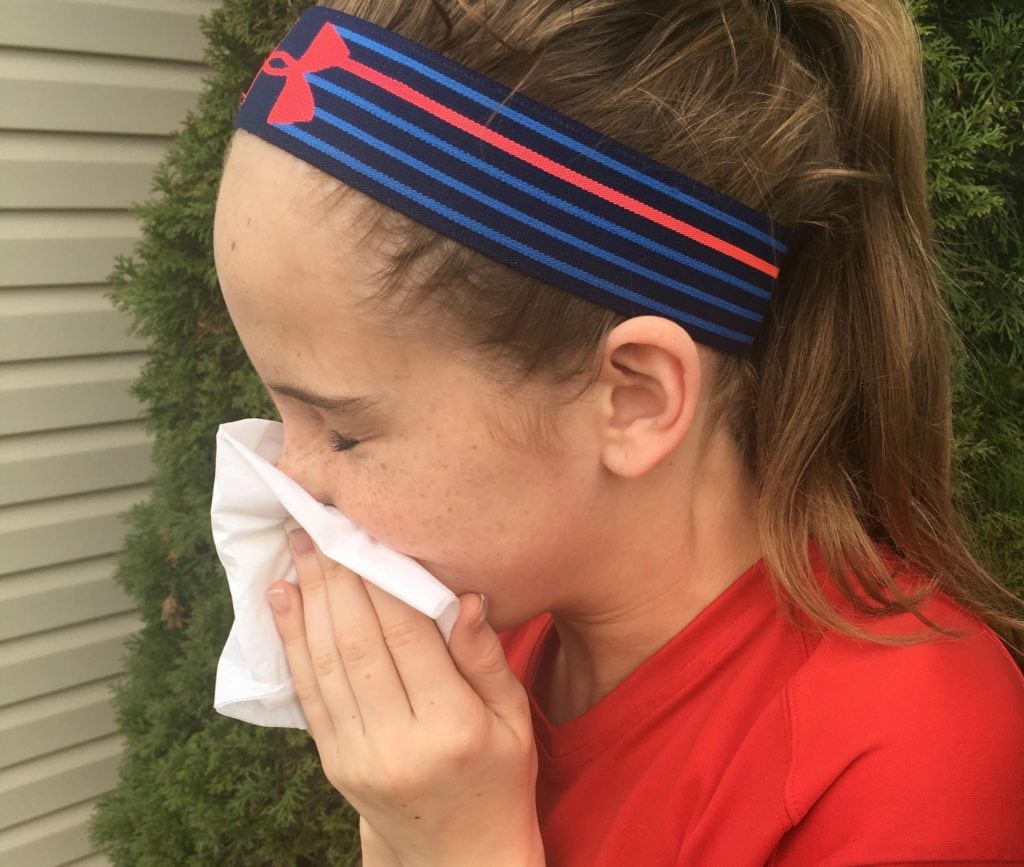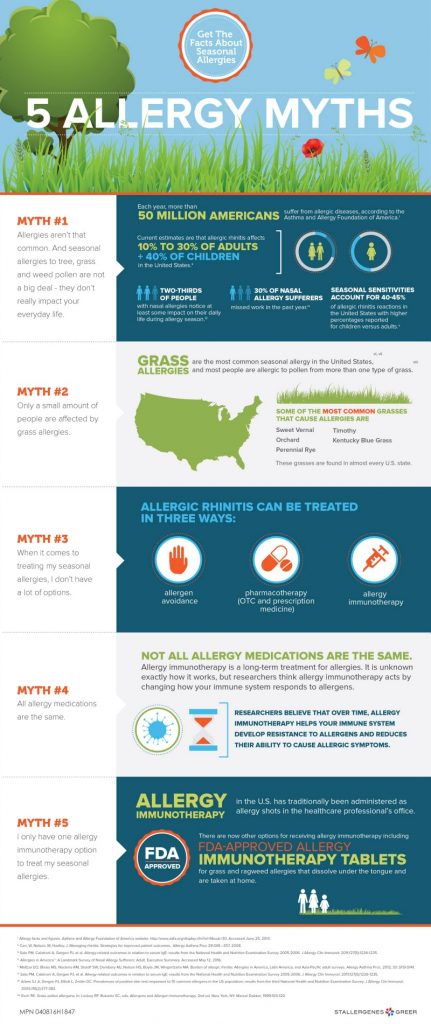This post is sponsored by Stallergenes Greer. Disclaimer: I am not a Doctor and this should not be taken as medical advice. Please consult your Doctor before starting this, or any other, medication or treatment plan. I am not on ORALAIR (Sweet Vernal, Orchard, Perennial Rye, Timothy, and Kentucky Blue Grass Mixed Pollens Allergen Extract) Tablet for Sublingual Use; however, I am sharing because I thought it may help one of you.
“She is allergic to all grass, trees, weeds….smoke, dust and anything with fur or feathers.”
And thus my allergy journey began at the age of seven as my poor back and arms swelled with every pinprick my body rejected. I can remember how quickly it all began to happen. The doctor placed four plates of 20+ potential allergen causing needles on my back as we began the test. He also ran a few extra up and down my arms. The initial pain from the shots quickly gave way to the heat and itching as my body reacted to one allergy causing item after another.
The conclusion: I was an allergy kid and in need of weekly shots to manage it all. It felt like I was allergic to the world – anything and everything outside the bubble of my home, but the shots were the only option to manage them.
Now, as a mother with two small people (ages 11 and 13) who are incredibly active outside – especially in the Spring and Summer, I have encountered allergies from the perspective of the care-giver.



And I would love for both you and I to make it through Spring Allergy Season with ease.
Let’s first talk a bit about the facts and myths surrounding the allergies that effect us the most. Let’s be clear – allergies are not an uncommon problem, grass allergies are the biggest issue so many of us face, but there are options and not all medications we might take are the same.

5 Ways to Tackle Spring Allergies
Close it up – I admit, as Spring settles in, I desperately want to open all of the windows and let the ‘fresh air’ in. After the stuffiness of Winter, it sounds like a little slice of magic to feel a warm Spring breeze float through my home. But for allergy suffering families like ours? That is one of the worst things we can do. With that beautiful breeze, comes the grass and pollen that make our eyes swell. So friends, keep those windows and sliding glass doors closed.
Sip on it – Keeping yourself and your allergy children hydrated is important. Sipping on water or juice can keep your nasal passages from drying out and provide some relief. Going with hot liquids like tea or broth have the additional benefit of cloaking you in a bit of steam.
Steam it out – Speaking of steam – sit in a hot shower. Or place your face above a warm sink with a towel over your head to trap the steam as it reaches your face and helps to relieve your stuffy nose and allow you to breathe more easily.
Clean it up – Do everything you can to keep from tracking the outdoor allergens in to your home. Take your shoes off as you enter. If you’ve spent a lot of time outside (see: my kids playing Spring Baseball and Softball), change as soon as you get home, try to isolate the clothes you wore and even consider hopping right in the shower to rid yourself of anything that make trigger your allergies.
Make the Call – Consider talking to your doctor about your options. Remember that little girl (me) who was doomed to weekly allergy shots to seek relief? There are other options now that allow you that same relief at home should you be considered a candidate for this therapy. Have you heard of ORALAIR an under-the-tongue (sublingual) immunotherapy medicine prescribed to treat sneezing, runny nose or itchy eyes due to an allergy to one of the five grass pollens? It is the only FDA approved sublingual allergy immunotherapy tablet that includes a five-grass (the ones most widely seen throughout the United States) mixed pollens allergen extract from Sweet Vernal, Orchard, Perennial Rye, Timothy and Kentucky Blue Grass. This type of immunotherapy has traditionally been given in your allergy doctor’s office as a shot (yep, just like me), but ORALAIR makes it possible to receive treatment in the comfort of your home after the initial dose is administered in your doctor’s office. ORALAIR is taken for about four months before the expected start of the grass pollen season and is continued throughout the grass pollen season.
What would you add to the list? Wishing you a sneezing-runny-nose-itchy-eye- FREE Spring Season.
ORALAIR does contain a boxed warning. In children and adults, the most commonly reported side effects were itching of the mouth, lips, tongue or throat. These side effects, by themselves, are not dangerous or life-threatening. ORALAIR can cause severe allergic reactions that may be life-threatening. Symptoms of allergic reactions to ORALAIR include: trouble breathing, throat tightness or swelling, trouble swallowing or speaking, dizziness or fainting, rapid or weak heartbeat, severe stomach cramps or pain, vomiting, or diarrhea, severe flushing or itching of the skin. For more information, head here.
Disclosure: I am happy to have partnered with Stallergenes-Greer to share tips for making it through Spring Allergy Season and ORALAIR. As always, all thoughts and opinions are mine and mine alone.
Indications and Usage
ORALAIR (Sweet Vernal, Orchard, Perennial Rye, Timothy, and Kentucky Blue Grass Mixed Pollens Allergen Extract) is a prescription medicine used for sublingual (under the tongue) immunotherapy prescribed to treat sneezing, runny or itchy nose, nasal congestion or itchy and watery eyes due to allergy to these grass pollens. ORALAIR may be prescribed for persons 10 to 65 years old whose doctor has confirmed are allergic to at least one of these five grass pollens.
ORALAIR is NOT a medication that gives immediate relief of allergy symptoms. ORALAIR is taken about four months before the expected start of the grass pollen season and is continued throughout the grass pollen season.
Important Safety Information
ORALAIR can cause severe allergic reactions that may be life-threatening. Symptoms of allergic reactions to ORALAIR include:
- Trouble breathing
- Throat tightness or swelling
- Trouble swallowing or speaking
- Dizziness or fainting
- Rapid or weak heartbeat
- Severe stomach cramps or pain, vomiting, or diarrhea
- Severe flushing or itching of the skin
If any of these symptoms occur, stop taking ORALAIR and immediately seek medical care. For home administration of ORALAIR, your doctor should prescribe auto-injectable epinephrine for you to keep at home for treating a severe reaction, should one occur. Your doctor will train and instruct you on the proper use of auto-injectable epinephrine.
Do not take ORALAIR if you or your child:
- Has severe, unstable, or uncontrolled asthma;
- Had a severe allergic reaction in the past that included trouble breathing, dizziness or fainting, or rapid or weak heartbeat;
- Has ever had difficulty with breathing due to swelling of the throat or upper airway after using any sublingual immunotherapy before;
- Has ever been diagnosed with eosinophilic esophagitis; or
- Is allergic to any of the inactive ingredients contained in ORALAIR.
Stop taking ORALAIR and contact your doctor if you or your child has any mouth surgery procedures (such as tooth removal), develops any mouth infections, ulcers or cuts in the mouth or throat, or has heartburn, difficulty swallowing, pain with swallowing, or chest pain that does not go away or worsens.
In children and adults, the most commonly reported side effects were itching of the mouth, lips, tongue or throat. These side effects, by themselves, are not dangerous or life-threatening.
You may report side effects to the FDA at 1-800- FDA-1088 or www.fda.gov/medwatch. Talk to your doctor before using ORALAIR while pregnant or breastfeeding.
Please see full Prescribing Information, including Boxed Warning and Medication Guide.

Allergy season is the worst! Everyone in my family has terrible allergies, and we have to make sure we do everything we can to mitigate our allergies.
This is great information and great tips. I don’t take anything for my allergies anymore but I do have to give allergy meds to my labrador. I use essential oils in a diffuser which helps me breathe and opens up my head.
My allergies have been worse the last two weeks than EVER before. A couple days ago I had my carpets cleaned and that seems to have helped me out a bit. Anyway, thanks for the great post, and good luck to your kids as they fight through allergy season.
These are smart tips for tackilng spring allergies. While I have none, my husband and younger daughter suffers from them.
Everyone in my office right now is dealing with allergies hard! I normally get them too, not sure when I will get the normal symptoms?!
These are all great tips. My 8 year old was recently diagnosed with seasonal allergies and we are still trying to figure things out.
I am one of the people with spring allergies. It’s annoying and frustrating sometimes. These are great tips, being hydrated all the time helps!
Great tips! Our son has seasonal allergies but fortunately, so far since spring started, it’s not been really bad compared to the previous years even though I had the windows open all the time.
I have always suffered from allergies throughout the year, but the springtime is the worst as it is for many. One of the things that it helps reduce symptoms is using an air purifier.
Those are really great tips for preventing allergies get through to your loved ones and even to yourself and I will definitely save this tips.
Being able to know the sign and symptoms will really be a good help and raise awareness too. Plus you can easily avoid it. Such great tips, Definitely worth to share.
Having a son who gets allergies at all time, this article really came in handy. These are very good an informative tips to know what to do. Thank you for sharing